Story by Leo Barraclough
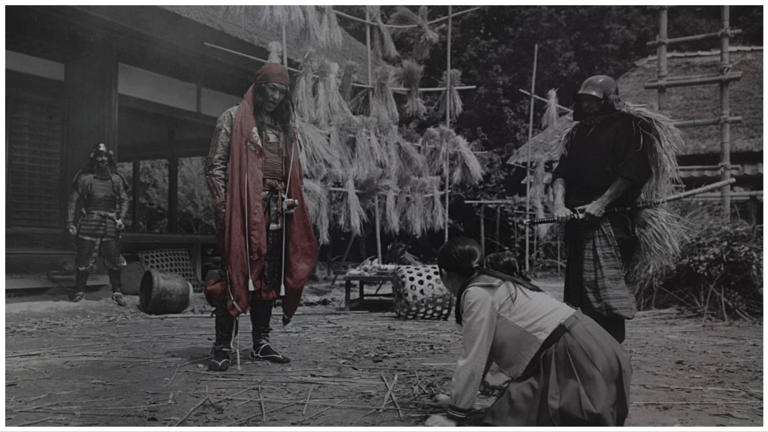
Japanese Sci-Fi Movie ‘From the End of the World' Takes Premier Prize at Genre Festival Fantasporto© Provided by Variety
The 44th edition of genre film festival Fantasporto, which runs in Portugal's second city Porto from March 1-10, has bestowed its best film award on Japanese sci-fi fantasy pic "From the End of the World," directed by Kaz I Kiriya.
The movie follows 10-year-old Hana, whose dreams transport her across various eras in Japanese history, and have the ability to save humanity.
The jury's special award went to "The Complex Forms," Italian director Fabio D'Orta's debut feature. The sci-fi horror centers on a man who has sold his body so it can be possessed by a creature of unknown nature.
The prize for best direction was nabbed by Spanish filmmaker Gonzalo López-Gallego for horror movie "The Shadow of the Shark" (La Sombra del Tiburon). In the film, a young woman, Alma, is undergoing therapy as she is unable to sleep. With the help of surveillance cameras, she discovers that during the night her home is under siege by dark and violent forces.
The actor award was taken by Tovino Thomas for fantasy-drama "Invisible Windows," directed by India's Dr. Biju. Set in a dystopian society, it follows an anti-war activist who starts to communicate with the dead.
Eve Ringuette took the actress honor for comedy horror film "Jour de Merde," the debut feature by Canada's Kevin T. Landry. A single mother on the verge of a nervous breakdown takes her teenage son on a work trip to interview a strange lottery winner in an isolated house in the woods.
The screenplay award went to French writer-director Sébastien Drouin for horror-thriller "Cold Meat." It follows David Petersen, who is driving through Colorado's Rockies. After saving a diner waitress from her violent ex-husband, he hits the road again alone through a blizzard, when his car crashes into a ravine. Outside a beast is prowling.
The cinematography award went to Germany's Roland Stuprich for Timm Kröger's metaphysical noir "The Universal Theory."
Shirin Ekhlasi's Iran-set thriller "Acid Base" was named best short film. The shorts jury gave a special mention to French animation "Stabat Mater."
Steven Gaydos, Variety‘s executive vice president, global content, received the Fantasporto Special Award. The festival bestowed the award to honor Gaydos' career as a film journalist, author, screenwriter and producer. Ate de Jong's love story "Heart Strings," which Gaydos co-wrote and produced, had its world premiere at the festival.
The Fantasporto career award went to Belgian director Karim Ouelhaj.
FANTASPORTO AWARDS
INTERNATIONAL FANTASY SECTION
Film Award
"From the End of the World," Kaz I Kiriya (Japan)
Jury's Special Award
"The Complex Forms," Fabio D'Orta (Italy)
Direction
Gonzalo López-Gallego, "The Shadow of the Shark" (Spain)
Actor
Tovino Thomas, "Invisible Windows" (India)
Actress
Eve Ringuette, "Jour de Merde" (Canada)
Screenplay
Sébastien Drouin, "Cold Meat" (U.K./Canada)
Cinematography
Roland Stuprich, "The Universal Theory" (Germany/Austria/Switz.)
Short Film
"Acid Base," Shirin Eklasi (Iran)
Special Mention
"Stabat Mater," Hadrien Maton, Quentin Wittevrongel, Arnaud Mege, Coline Thelliez, William Defrance (France)
DIRECTORS' WEEK
Film Award
"Bucky F*cking Dent," David Duchovny (U.S.)
Jury's Special Award
"Shadow of Fire," Shinya Tsukamoto (Japan)
Director Award
Loïc Tanson, "The Last Ashes" (Luxemburg)
Screenplay
"A Normal Family," Jin-Ho Hur (South Korea)
Actor
Zhu Yilong, "Lost in the Stars" (China)
Actress
Tao Xinran, "Within" (China)
ORIENT EXPRESS
Film Award
"Creation of the Gods I: Kingdom of Storms," Wuershan (China)
Jury Special Award
"The Floor Plan," Junichi Ishikawa (Japan)
Jury Special Mention
"The Forbidden Play," Hideo Nakata (Japan)
PORTUGUESE FILM AWARD
Portuguese Film
"Departures," Vasco Viana (Portugal/Czech Republic)
School Film Award
"Esqueci – me que tinha medo," Diogo Bento (Portugal), Universidade Lusófona de Lisboa
Special Jury Award
"À Luz das Impressões," Luís Miguel Rocha (Portugal), Universidade da Beira Interior
OTHER AWARDS
Audience Award
"Half-Way Home," Isti Madarász (Hungary)
Critics Award
"Papa Mascot," Luisito Lagdameo Ignacio (Philippines)
Fantasporto Career Award
Karim Ouelhaj, Belgian director
Fantasporto Special Award
Steven Gaydos, producer, screenwriter, journalist at Variety
More from Variety
Fantasporto Chiefs Beatriz Pacheco Pereira and Mário Dorminsky on Spotting Rising
Oscars Big Snub? ‘Casablanca' Win Marked Boiling Point at Warner Bros.
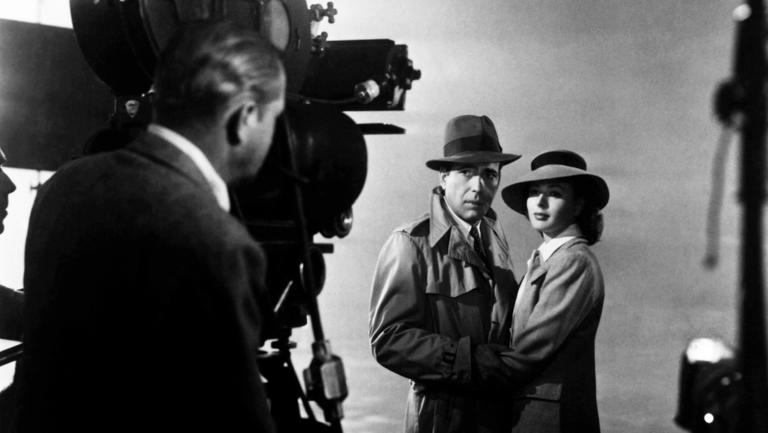
Jack Warner had been shouldering in on credit from one of his studio's top producers. At least that's what Hal Wallis may have told you after the 1944 Academy Awards when Jack Warner accepted the Casablanca Oscar that some felt should have been palmed by Wallis, the Warner Bros. film's producer. But who should accept the best picture award? Today it's the producers, but during Hollywood's Golden Age it was sometimes the producer, sometimes the studio chief.
Wallis had been with the company for many years, first joining the studio in 1923, their first year of incorporation. Soon, Wallis was managing essential Warner films such as Little Caesar (1931), The Petrified Forest (1936), The Adventures of Robin Hood (1937), Dark Victory (1939), Sergeant York (1941), The Maltese Falcon (1941), Yankee Doodle Dandy (1942), and, of course, Casablanca (1942). Despite being released in late 1942, Casablanca didn't go into wide release until early 1943 and wasn't eligible for Academy Award contention until 1944.
The 16th Annual Oscars were held on March 2, 1944, the first time at Grauman's Chinese Theater, and hosted by comedian Jack Benny. The 1944 Oscar for outstanding production (later changed to best picture) nominees were read by producer/director Sidney Franklin. Casablanca was up against some serious competition, including the powerful Homefront drama The Human Comedy and thrilling indictment of mob mentality in The Ox-Bow Incident. Wallis was up for another film as well with Watch on the Rhine. When Franklin read the winner, Hal Wallis got up to receive his award, but studio boss Jack Warner beat him to the stage. For Wallis, the episode was the last straw in an increasingly contentious relationship.
Jack Warner with the Casablanca Oscar, from Motion Picture Herald on March 11, 1944.
© Provided by Hollywood Reporter
On March 3, The New York Times recalled how Warner "seemed as surprised as everyone else when the plaster Oscar was handed to him." In her syndicated column, which didn't run in the Los Angeles Times until April 1, gossip maven Hedda Hopper reported that when the Oscar was announced, Jack "popped up on the stage with the speed of an antelope." As the audience applauded, Jack Benny asked "who's going to accept the award?" You can hear someone in the audience yell "Jack!" As soon as Benny saw Jack Warner he quipped, "oh, OH! Jack Warner, my boss!"
Jack: "Can I say a few words?"
Benny: "I would if I were you. Ya know, how you always talk, you ad lib…"
Jack: "First, I want to thank all those who participated in the making of this picture. From Mr. Wallis, the producer, to Mike Curtiz the director, to Humphrey Bogart, Miss Ingrid Bergman…"
While it's difficult to tell by the audio recording, there must have been a shuffle on stage or Benny got close to Warner and may have seen Wallis approaching. Jack broke his tribute to quip, "I'm not nervous kid, get your hand off my wallet."
Jack continued by thanking "Sydney Greenstreet, Peter Lorre, in fact everyone in the cast I can't remember them all. I didn't know we were going to win, if I did I would have rehearsed more. This is really a great pleasure, a tribute to our industry, and we feel very proud at Warner Bros. for this honor."
It's worth reiterating that the first person who Jack thanked was Hal Wallis, making it difficult to see this as a simply bid to steal credit. In his memoir, Wallis recalled the scene, "I stood up to accept when Jack ran to the stage ahead of me and took the award with a broad, flashing smile and a look of great self-satisfaction. I couldn't believe it was happening."
Hal Wallis with his Thalberg Award, from the Motion Picture Herald on March 11, 1944© Provided by Hollywood Reporter
Wallis was furious and, in what feels like a colorful fabrication invented in hindsight claimed that even as he tried to get into the aisle the rest of the Warner family blocked him. Whatever Warner family that may have been there would unlikely have been so aggressive in defending yet another one of Jack's odd public moments. It's no secret that Jack loved attention, and this was the period he began making people call him "Colonel Warner," but he used his moment on stage to thank a long list of people involved and offered a nod to the type of talent that makes his company great. In no way did he make it sound like this was his personal victory.
The Oscar night wasn't all lost for Wallis, who won his second Irving Thalberg Award, which was presented by his former Warner Bros. colleague Darryl F. Zanuck. This award was then a surprise accolade based on a year of production, whereas today it is given as a lifetime achievement award. The Thalberg Award at the time was given "for the most consistent high quality of production by an individual producer, based on pictures he personally produced during the previous year." It should be noted that one of those films, This is the Army (1943), was the movie that led the New York Times to brand the studio with the eternal kudos as a company who combined "good citizenship with good picturemaking."
An ad placed by Jack Warner in Motion Picture Daily , March 7, 1944© Provided by Hollywood Reporter
While many trade publications made no mention of any producer rivalry at the 16th Academy Awards, the next day, Edwin Schallert's Los Angeles Times column, titled "Warner-Wallis ‘Rivalry' Intrigues at Film Fete," took on the question about who deserved the Oscar, production chief or the film's producer? Although Jack "was first to the hitching post to receive the statuette," wrote Schallert, "the issue probably never will be solved any more than the various executive setups cooked up in movieland may be penetrated." He concluded that who gets the award generally goes to "who swings the biggest wallop at the moment in rampageous studio politics." Schallert also mused that both Warner and Wallis knew what awards were coming in advance.
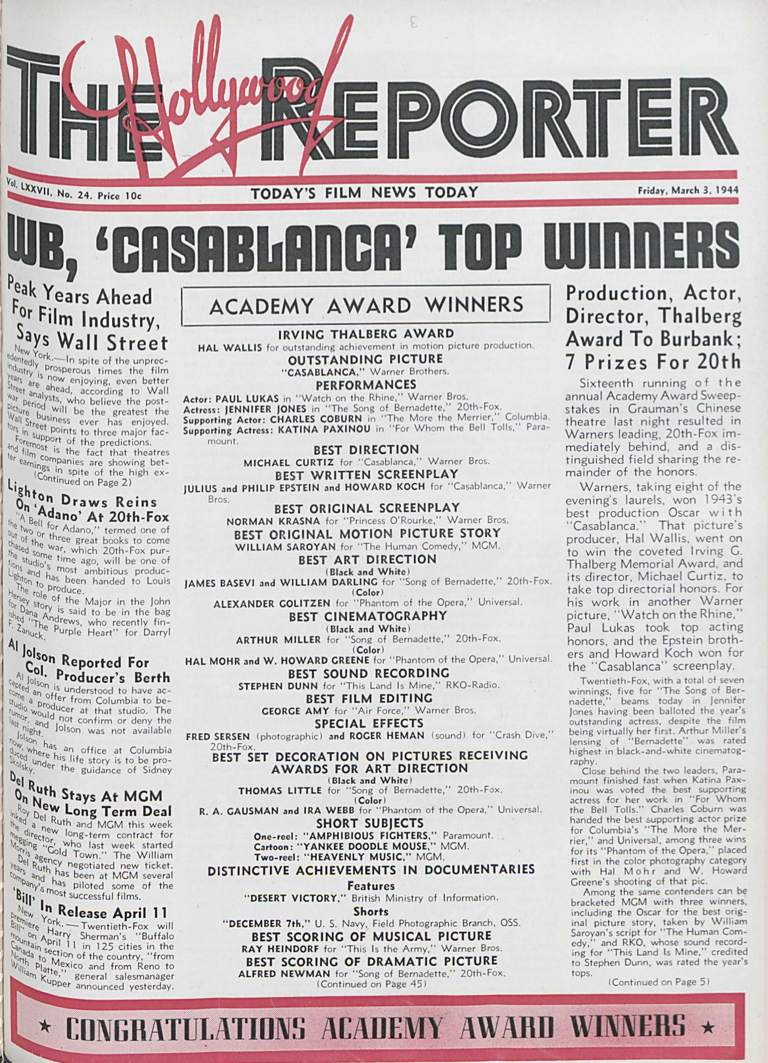
Legend has it that studio publicity boss Charlie Einfeld wrote to Academy president Walter Wanger asking Schallert for a retraction. According to Hollywood journalist Aljean Harmetz's book Round Up the Usual Suspects, when Wallis was asked about what to do about the bad press regarding Jack's "wallop," he retorted, "today's newspaper is tomorrow's toilet paper."
Agreeing to send a memo to Wanger, Wallis sent Einfeld's letter, co-written by Alex Evelove, that validated Jack's decision to take the Oscar. "I am also happy to have contributed by bit toward the making of that picture," Wallis's ghostwritten memo continued, "your comment in your column this morning on rivalry at Warner Bros. is totally unjustified. I would be grateful if you would correct the misleading impression created by it, as well as the impression that we had advance information on the awards."
Schallert quietly published Wanger's clarification on March 6, midway through the column under a nondescript headline. "No chance of Hal Wallis knowing in advance that he might receive the Irving Thalberg Award," wrote Wanger in a wire to the Los Angeles Times. He also assured readers that secrecy of ballots was held by the auditor until handed to the given presenter. Wanger also stated that studio heads may accept awards for outstanding production, as Louis B. Mayer accepted the award for Mrs. Miniver in 1943. The previous year gave precedent to Jack accepting the Oscar.
Still enjoying finding his name in print, Jack took an ad out in the trades that boasted how Warner Bros. always worked "to produce films that will help to champion the basic freedoms of democracy." Of course, the overarching idea of movies that can serve as a betterment of society was solely that of his brother, Harry, to which Jack followed his lead. Jack allegedly refused to let Wallis get pictures taken with the Casablanca Oscar on the lot. Wallis maintained that the Academy wrote him an apology and sent him his own Oscar for Casablanca.
Wallis ultimately left Warner Bros. for Paramount shortly after the Oscars debacle. Wallis cited contractual dispute, but everyone knew he needed a split from Jack. "This fighting for personal glory seems so silly," Hopper continued in her April 1 column, "The public doesn't give a hoot who produced what or when." The same can't be said for Jack Warner, who loved to see his name so much that he added it to the studio logo at the top of every film, including Casablanca, to read, "Jack L. Warner: executive producer," before any other name appeared on the screen.
The 1944 Oscar statues that were handed out at the ceremony were made of plaster, which was part of the industry's agreement to preserve metal during the war. Metal awards were later made and given to winners to replace the plaster stand-in. Greg Orr, Jack's grandson and producer of the documentary The Last Mogul, said that "I believe Jack did jump up and accept the award because he really wanted it … and Jack loved to promote Warner Bros. and himself." The studio hadn't won a best picture since 1937, so Jack was largely over-eager to boast again. That said, Orr continued, "I understand Wallis feeling slighted, but he worked in a studio system where the studio decided everything, or tried to."
"Almost forty years later," Wallis wrote in his 1980 memoir, "I still haven't recovered from the shock." The truth is that both men played a role in the film's creation. Jack greenlit the project, hired his good friend Michael Curtiz to direct, weighed in on casting (lobbied for Bogart), and dealt with the censorship office. Most histories still understandably view Jack's Casablanca Oscar acceptance as in poor taste. As Alan Rode confirmed in his biography of Curtiz, Wallis was still the primary shepherd on this production and deserved better public recognition for a "deserved triumph." However, maybe Hedda Hopper was right when she wrote that the public doesn't care, "all they're interested in is, is it a good picture?"
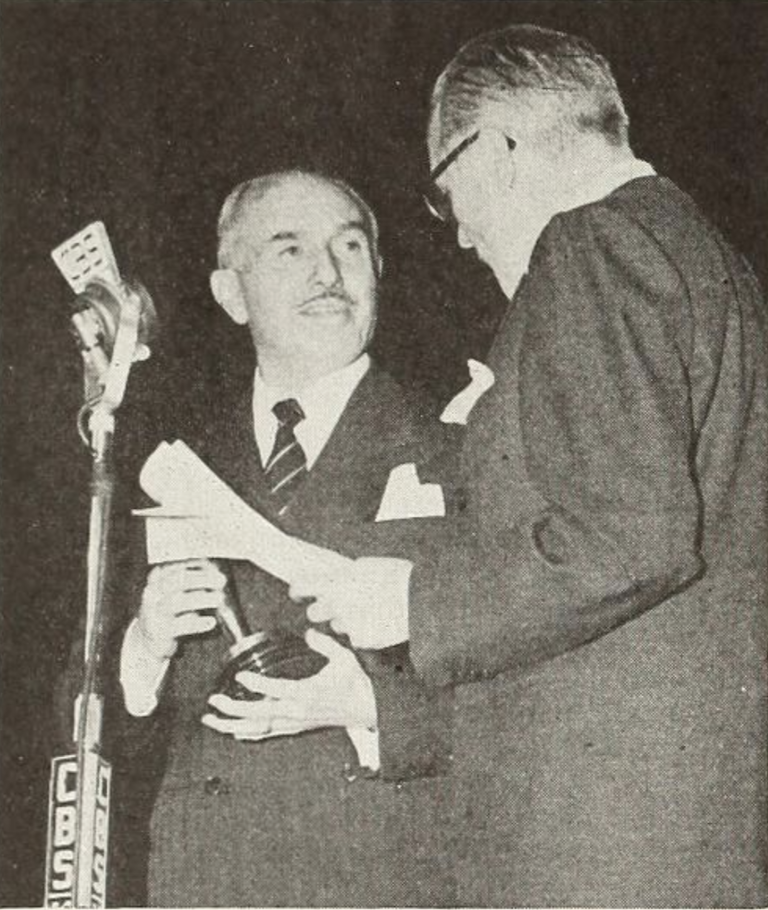
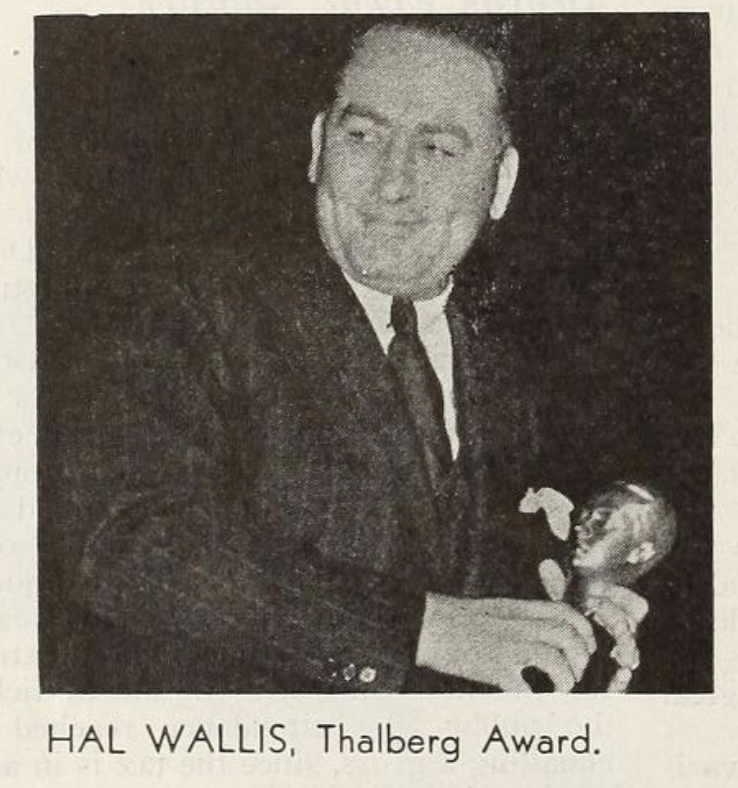
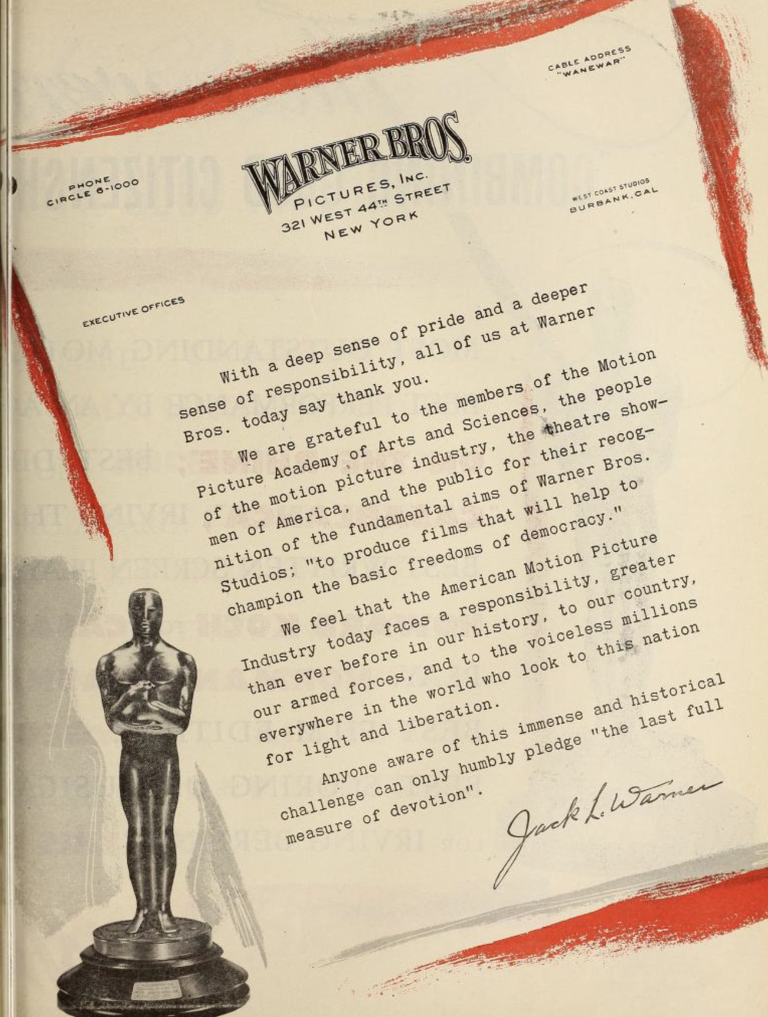
No comments:
Post a Comment